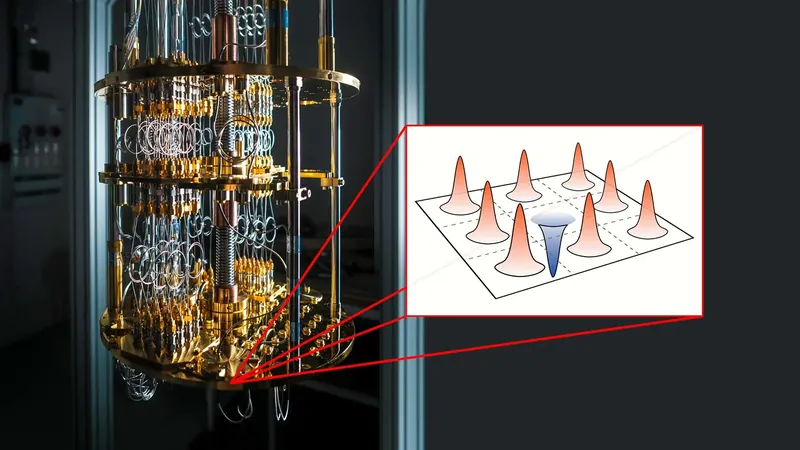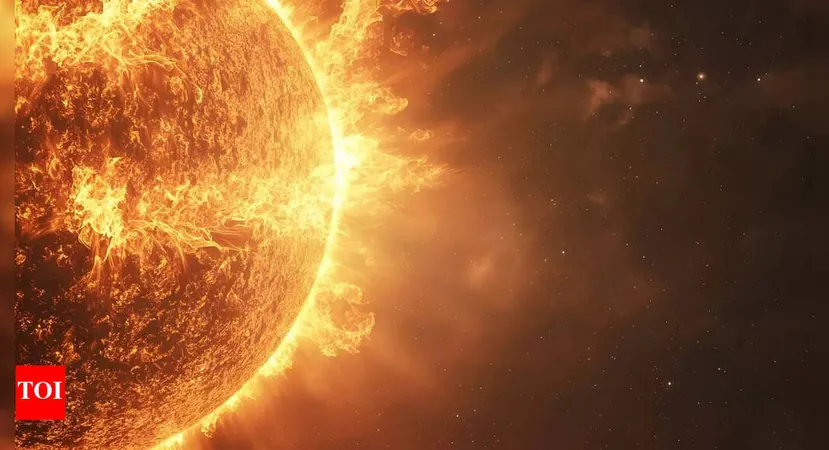
Groundbreaking Algorithm Unlocks Error Correction for Quantum Computing
2025-07-02
Author: Benjamin
A Quantum Leap in Simulating Error Correction
July 2, 2025 — The race to unlock the true potential of quantum computing has taken a monumental step forward. Researchers from Chalmers University of Technology, the University of Milan, the University of Granada, and the University of Tokyo have pioneered a groundbreaking method to simulate quantum computations crucial for error correction. This innovation addresses a significant barrier that has stymied fault tolerance in quantum computing, paving the way for truly reliable and practical applications.
The Promise of Quantum Power
Quantum computers are not just a fad; they hold the promise of solving complex problems beyond the reach of today’s supercomputers, with potential breakthroughs in fields like medicine, energy, encryption, artificial intelligence, and logistics. Yet, their success hinges on overcoming a major obstacle: error correction.
The Challenge of Error Correction
While traditional computers have established methods for error correction, quantum computers struggle due to their unique nature. Quantum bits, or qubits, are not only powerful but also incredibly fragile. A mere vibration or change in temperature can lead to catastrophic errors, making it essential to find ways to accurately simulate and correct these errors.
World-First Simulation Breakthrough
In a groundbreaking achievement, this research team has unveiled a method to accurately simulate a specific type of quantum computation designed for error correction, known as the Gottesman-Kitaev-Preskill (GKP) code. Cameron Calcluth, a PhD student in Applied Quantum Physics, emphasized the significance of this breakthrough, stating it allows for the simulation of quantum computations that enhance fault tolerance—a vital requirement for constructing robust quantum computers.
Understanding the Fragility of Qubits
At the heart of quantum computing lies the qubit, capable of holding numerous states simultaneously thanks to quantum superposition. However, this extraordinary computational capacity comes at a cost: qubits can easily lose their coherence and, consequently, their ability to process information when exposed to environmental disturbances.
Innovative Solutions Through New Algorithms
To navigate these challenges, researchers utilize error correction codes, which distribute information across multiple systems to enable error detection and correction. The method they've developed leverages a newly created algorithm that incorporates GKP codes, dramatically simplifying the error correction process and enhancing resilience against external noise.
A New Era for Quantum Simulations
Giulia Ferrini, an Associate Professor of Applied Quantum Physics at Chalmers, noted that this new approach opens up previously uncharted territory for simulating quantum computations. With enhanced reliability in testing quantum calculations, researchers are better positioned to construct stable, scalable quantum technologies.
Conclusion: Brighter Horizons Ahead
As the realm of quantum computing continues to evolve, this pioneering algorithm not only signifies a leap in simulating error correction but also heralds a new era of possibilities for quantum technologies. The future looks bright for a field that promises to revolutionize our world.









 Brasil (PT)
Brasil (PT)
 Canada (EN)
Canada (EN)
 Chile (ES)
Chile (ES)
 Česko (CS)
Česko (CS)
 대한민국 (KO)
대한민국 (KO)
 España (ES)
España (ES)
 France (FR)
France (FR)
 Hong Kong (EN)
Hong Kong (EN)
 Italia (IT)
Italia (IT)
 日本 (JA)
日本 (JA)
 Magyarország (HU)
Magyarország (HU)
 Norge (NO)
Norge (NO)
 Polska (PL)
Polska (PL)
 Schweiz (DE)
Schweiz (DE)
 Singapore (EN)
Singapore (EN)
 Sverige (SV)
Sverige (SV)
 Suomi (FI)
Suomi (FI)
 Türkiye (TR)
Türkiye (TR)
 الإمارات العربية المتحدة (AR)
الإمارات العربية المتحدة (AR)